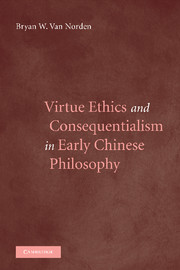1 - Introduction
Published online by Cambridge University Press: 25 July 2009
Summary
Within the four seas, all are brothers.
– ZixiaI am a human, and nothing human is alien to me.
– TerenceMETHODOLOGY
Brief Description
There is often discussion of whether the teachings of the Chinese “masters” (zǐ 子) are “really philosophy.” This is a contentious issue because resolving it depends on deciding what philosophy is in general. I hope in this book to sidestep these issues by stating that I plan to examine the teachings of Kongzi (“Confucius”), the early Mohists, and Mengzi (“Mencius”) from a particular sort of philosophical perspective. One can examine almost any text from a philosophical perspective, whether or not one regards that text as “genuinely philosophical.” Of course, applying a philosophical perspective to a text may be more or less fruitful. And there may be disagreement over whether the results have been fruitful. For example, most contemporary philosophers seem to think that – although they are crucial background reading for anyone interested in Greek cosmology – the writings of Hesiod yield little when examined philosophically, but a few think that asking certain philosophical questions reveals important aspects of Hesiod's writings. I believe that we can learn much through applying a philosophical perspective to the Chinese “masters.”
Philosophers use specialized terminologies and are concerned with specialized issues. Scholars from other intellectual disciplines (social history, anthropology, sociology, literary criticism, etc.) may approach the same texts from other perspectives – which can be equally worthwhile.
- Type
- Chapter
- Information
- Publisher: Cambridge University PressPrint publication year: 2007
- 1
- Cited by



